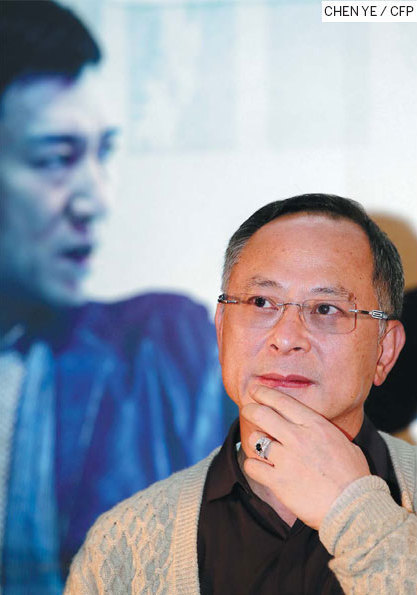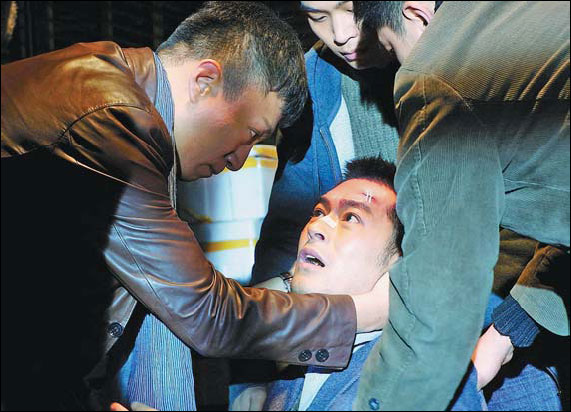

Johnnie To (top) and a scene from his new movie, Drug War. CFP
The reigning king of Hong Kong gangster movies is dipping his toes in the mainland market, prompting questions of compromise and betrayal, themes often explored in his oeuvre, Raymond Zhou reports.
Johnnie To makes movies for one of two purposes: either to express himself or to make money for his company. He just won't tell you which movie falls into which category. "You'll have to take a guess," he says, whimsically.
The trouble is, even experts disagree which of his movies lean toward art and which toward commerce. It seems he has a way of blurring the line and fusing the two.
The same goes for Drug War, his new crime thriller. As his first salvo into the mainland market, which is much larger than his native Hong Kong, To has to make a few adjustments. "I'll have to follow the rules of 'political correctness'," he admits.
By that, he means that law-enforcement officers must be given a positive portrayal and bad guys have to be punished in the end. That kind of black-and-white treatment does not leave much room for subtlety or nuance, or characterization in the gray area. "But it does not matter in this film," To explains. "What counts most is human nature."
Johnnie To is the last heavyweight Hong Kong filmmaker to enter the mainland market.
For 10 years when Hong Kong movies were no longer counted as imports and his peers migrated north en masse to cater to a much larger audience, To held out with his quintessentially Hong Kong gangster shootout and mob extravaganza - but had tantalized with two romance movies.
To has emphasized that his approach to the gangster genre is different from that of John Woo even though they share similar themes, such as loyalty and brotherhood.
While Woo is operatic and over-the-top, To likes his work to be subdued and taut.
"I started with a more romantic and stylized method. But not every movie is suitable for that style. Some can be kinetic and realistic. It all depends on the subject matter," he tells China Daily.
But sometimes, stylization can be a way to avoid the pitfall of censorship, as realistically depicted violence can be more offensive. Drug War ends with a graphic scene of the execution of the bad guy, who has exceeded the amount of illegal drugs manufactured or trafficked that warrant the death penalty and has also betrayed all of his gangster friends and colleagues.
"Death by injection is less violent than death by a bullet in the head," To notes.
Some of his best gangster films, such as the Election franchise, rise above the genre. They are light on action and heavy on innuendo, which provides film critics with fertile ground for interpretation. But Drug War is more limited in ambition. It has to respect the parameters set by government agencies.
Known for his fiery temper onset, To is philosophical about his future away from his Hong Kong enclave.
"It's all about finding the balance," he explains.
Still, one is surprised how To and his latest movie pushed the boundary. For one thing, drug-taking, which had been a strict taboo for mainland films, is given ample screen time.
The trick is, To did not glamorize it.
He showed the instant consequence of the policeman, the good guy in the movie, who is posing as a drug dealer and has to pass a test by snorting. That scene also gives Sun Honglei, the mainland star on an upward trajectory in recent years, an opportunity to show off his acting chops as the character, as soon as the real drug dealers are gone, he desperately seeks a way to rid himself of the inhaled substance.
Still, this character is not glorified, To insists.
"He has to be believable to the mainland audience."
The plot, however, is driven by the other half of the equation, the nemesis of the cop, the Hong Kong drug-maker fleeing from an accident and ending up driving into a streetside restaurant.
When caught at the beginning of the movie, he agrees to collaborate with the police and tricks other triad members into a police trap. To attributes the guy's motivation as "a survival instinct", which causes the death of everyone, including all law-enforcement members involved in the final gunfight.
But it can be argued that this character is not well fleshed out. There is little progress in his inner world until the sudden change in the finale. Likewise, the few women characters function mainly as wallflowers.
This brings us to To's flirtations with the romance genre.
In his prolific oeuvres, love stories have taken quite a few slots. While expertly crafted, they somehow lack a spirit that buoys this particular genre. When probed, To deferred to Ka-Fai Wai, his writing partner. It seems romance is not something close to his heart - the film genre, I mean.
Wine, on the other hand, is something To is passionate about. He is both a connoisseur and a collector. But he says he is not interested in making a movie like Sideways that exploits his hobby.
"Maybe in the future, when I'm inspired," he adds.
For those into parlaying the sources of To's artistic style, here is a list of movies that fascinated him in his formative years.
"I loved to watch action movies, especially Roman gladiators and American cowboys. Japanese samurais and Hong Kong martial arts were also my favorites. The filmmaker I love the most is Akira Kurosawa," To reveals.
Even though To is embraced mainly for his gangster flicks, his versatility and efficiency - with 50 movies under his directorial belt - have endowed him with the rare ability to adapt to a changing environment.
"Even if one of my arms is cut off, I can still function with what remains," he once said.
In 2011, To made Life Without Principle, a dark heist movie that is more drama than action. It was well received in the cineaste circle.
Maybe someday he will switch to this genre when his bloody shootouts are no longer in vogue or flatly banned.
He can probably make reading the telephone book pulsating.
Contact the writer at raymondzhou@chinadaily.com.cn.
By Raymond Zhou
